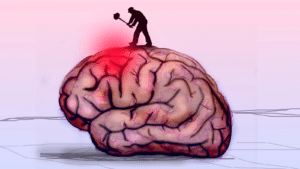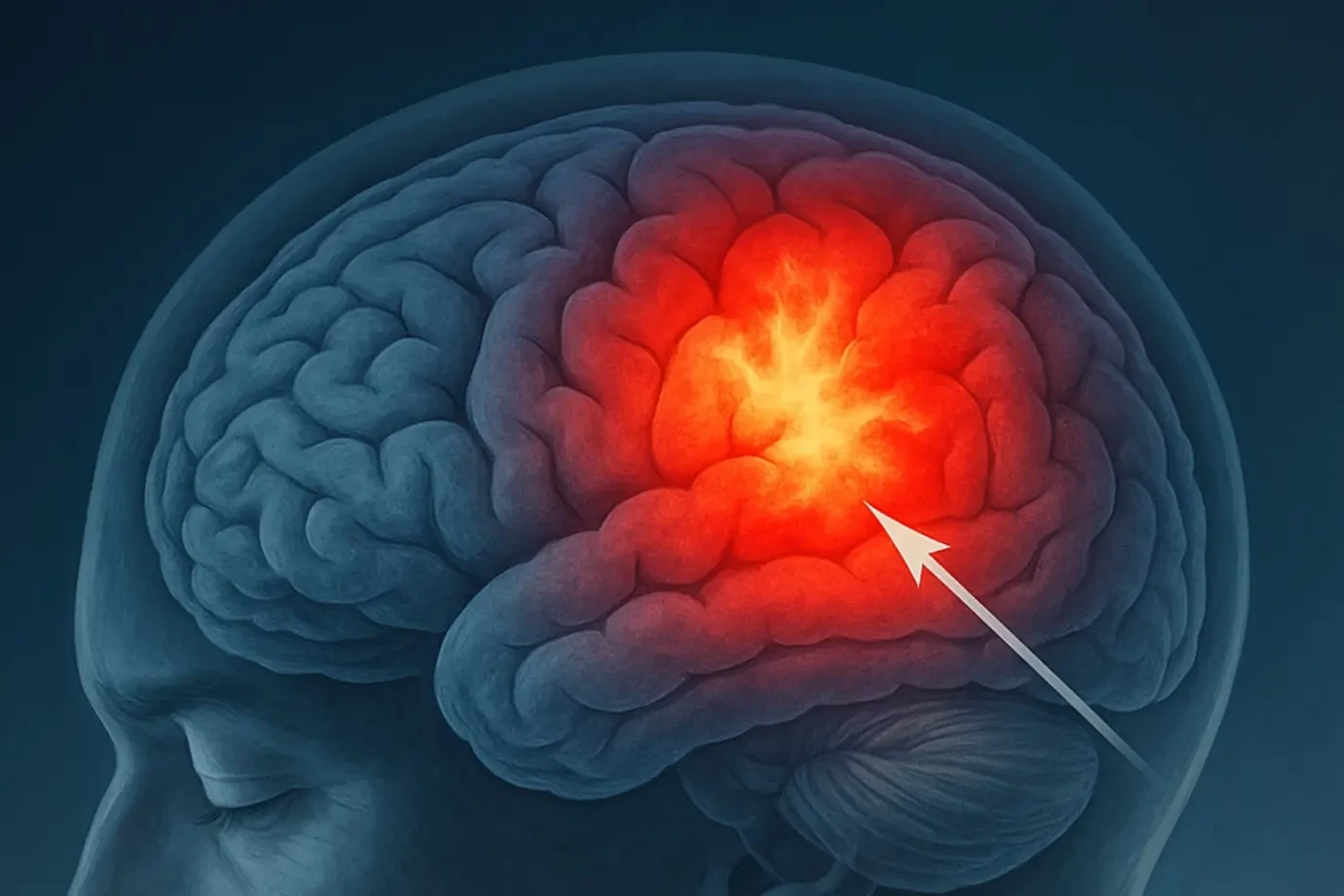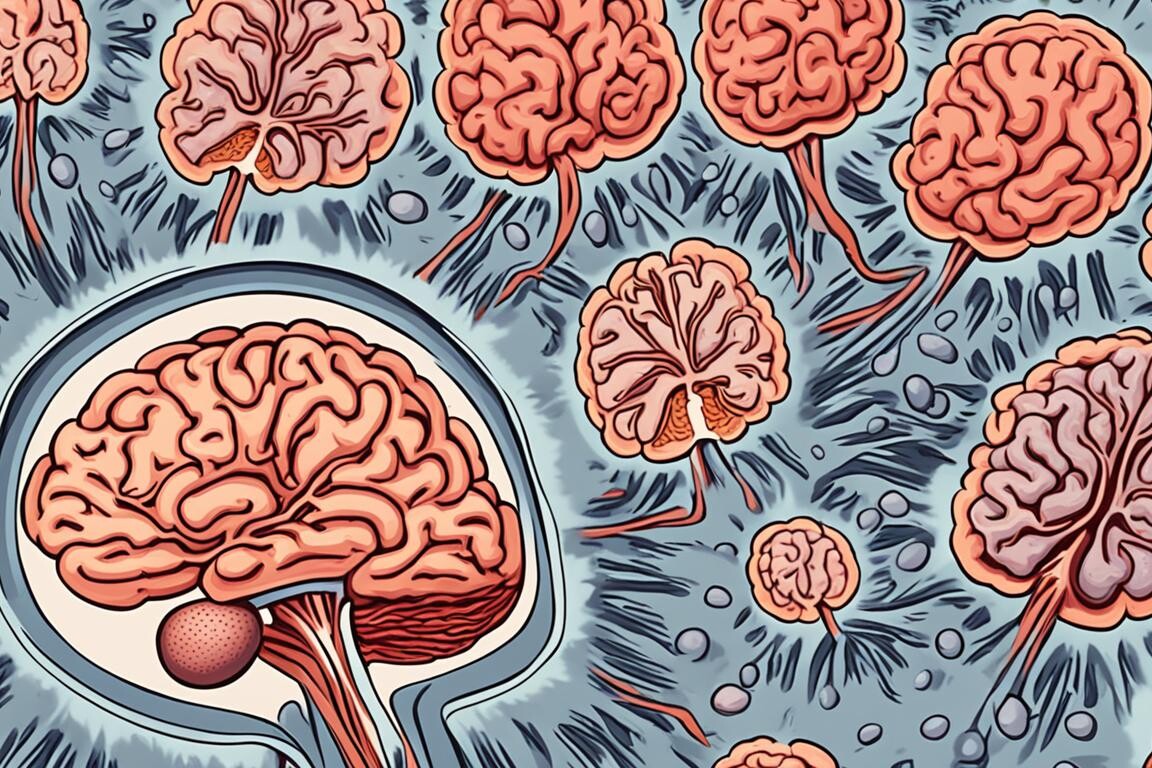Encephalitis is a serious illness that causes the brain to swell. This swelling can happen because of a virus or bacteria. Or, your immune system might fight your brain by mistake. It’s very important to know the encephalitis symptoms. This knowledge can save lives, making it critical to get early diagnosis and treatment.
There are two main kinds of encephalitis. Infectious encephalitis comes from a virus, while autoimmune encephalitis is when your immune system attacks your brain. But no matter the cause, it’s key to watch for possible symptoms of encephalitis. If you or anyone you know shows these signs, seeking medical help right away is advised.
Table of Contents
ToggleWhat is Encephalitis?
Encephalitis (en-sef-uh-LIE-tis) means your brain is inflamed. It can happen from viruses, bacteria, or your own immune system attacking. This can be very serious.
Overview of Encephalitis
Encephalitis can have big effects. It can even cause death. What’s interesting, is we don’t know the cause about half of the time.
Types of Encephalitis
There’s infectious and autoimmune encephalitis. Infectious means a germ causes it. Autoimmune happens when your body attacks your brain.
Infectious vs. Autoimmune Encephalitis
Infectious encephalitis starts with the flu, then gets worse. You might get confused or have seizures. Autoimmune encephalitis shows up slower. You could lose your memory or see things that aren’t there.
Common Encephalitis Symptoms
It’s crucial to know the common symptoms of encephalitis for quick diagnosis and treatment. Encephalitis shows different symptoms. This depends on its cause and type.
Physical Symptoms
At first, encephalitis can feel like the flu. You might have a headache, fever, and feel tired. As it gets worse, you could also feel confused, have seizures, or see changes in how you move or hear.
Cognitive Symptoms
In some cases, symptoms show up more slowly, over weeks. You might start acting differently, have trouble remembering, or even see things that aren’t there. These symptoms can really change how a person lives day to day.
Symptoms Due to Specific Types
The signs of encephalitis change based on its root cause. For instance, if a virus is the cause, it might seem like the flu at first. But if it’s autoimmune, the changes might happen more slowly, with shifts in behavior and thinking. Knowing these differences can help with diagnosis.
Encephalitis symptoms
Early Warning Signs
Encephalitis warning signs can feel like the flu. You might have a headache, fever, and feel tired. It’s easy to miss these symptoms, but seeing a doctor quickly is important.
Severe Symptoms Requiring Immediate Care
Some signs of encephalitis are severe and need quick attention. These include being confused, acting strange, or having seizures.
You may also find it hard to move some parts of your body or pass out. If these happen fast over hours or weeks, you need to get treated right away.
Symptoms in Infants and Children
Babies and young kids can show different signs of encephalitis. They might not eat well, feel stiff, or be upset a lot.
Watch for a bulging soft spot on their head, throw up, or be very fussy. A doctor should check them out right away.
Causes and Risk Factors
Encephalitis is often caused by viruses. Types like herpes, Epstein-Barr, and West Nile are common. These viruses can make the brain swell, which can cause serious problems.
Viral Causes
In the U.S., herpes types 1 and 2 are a big cause. They impact about 10% of cases. Unfortunately, this kind of encephalitis is very severe, with a high death rate if not treated.
Bacterial and Other Infectious Causes
But it’s not just viruses; bacteria and other germs can also lead to encephalitis. Some bacteria, like those spread by mosquitoes, can cause serious issues like encephalitis.
Autoimmune Encephalitis Causes
Less often, the body’s immune system can wrongly attack the brain. This leads to swelling and serious conditions. Special treatments like removing tumors might be needed in these cases.
Risk Factors for Encephalitis
Age plays a big part in who gets encephalitis. Young kids and older people are more at risk, as are those with weak immune systems. Where and when you are also matter, as certain infections are more common in some places and during warmer times.
Diagnosing Encephalitis
Diagnosing encephalitis needs a detailed medical history and a full physical exam. Tests are also critical. Doctors will try to figure out what’s causing your symptoms and how to treat it.
Medical History and Physical Exam
Your doctor will first ask about your health history. They’ll want to know about recent sickness, where you’ve been, and what you’ve been around. Then, they’ll do a careful exam. They’ll look for things like swelling and problems with the nerves, which could be signs of encephalitis.
Diagnostic Tests for Encephalitis
Tests can vary based on your symptoms and possible causes. But they may include:
- Neuroimaging (MRI or CT scan) to look for brain swelling or issues
- Lumbar puncture (spinal tap) to check your cerebrospinal fluid for infection
- Electroencephalogram (EEG) to see your brain’s activity and any seizure signs
- Blood, urine, or throat samples to find viruses or other germs
- Imaging studies to find tumors that might be causing a reaction in your body
In complex cases, a brain tissue biopsy or intracranial pressure monitoring might be needed. This helps with a certain diagnosis and treatment plan.
Treatment Options
If you’re diagnosed with encephalitis, treatment depends on its cause and symptoms’ seriousness. The main goals are to treat the cause, handle symptoms, and avoid problems. You may get antiviral or antibiotic drugs, immunotherapies, and help for day-to-day activities. Rehabilitation might also be part of the plan.
Antiviral and Antibiotic Medications
Viral encephalitis might need antiviral drugs like acyclovir, foscarnet, or ganciclovir. They fight the virus and make symptoms less severe. If a bacterial infection causes it, you might take antibiotics.
Immunotherapy for Autoimmune Encephalitis
If autoimmune encephalitis is the issue, you might need immunotherapies. These include corticosteroids, IVIg, or plasma exchange to lower the immune system’s attack and brain inflammation.
Supportive Care and Symptom Management
Supportive care is vital, no matter the cause. It includes help with breathing, IV fluids, anti-inflammatory drugs, and anti-seizure meds. They aim to reduce symptoms and avoid lasting issues. Rehabilitation like physical or speech therapy also helps recovery.
For a sudden or severe encephalitis case, prompt medical care is essential. An expert team, with infectious disease and neurology specialists, will create a treatment plan just for you.
Conclusion
Encephalitis outcomes vary a lot, based on the cause, how bad it is, and how quickly it’s treated. In mild cases, people often fully recover. But in severe cases, there might be lasting brain problems or even death. Lately, encephalitis cases have been increasing, with 7 to 15 out of every 100,000 people worldwide facing it.
Prognosis and Recovery
If someone has severe encephalitis, getting better can take a long time and it’s hard. They might need months or years of rehab and help from lots of doctors. About half of those who survive Japanese encephalitis could have lasting mental and brain issues. And for some viruses, like West Nile, the chance of dying is as high as 30%.
Prevention Tips
To stop encephalitis, it’s key to keep clean, get all your shots, and avoid mosquito and tick bites, especially in risky places. The chance of getting encephalitis from dengue, Zika, or chikungunya viruses is between 0.5% and 20%. This tells us we should be active in protecting ourselves and our family.
FAQ
What is encephalitis?
Encephalitis is brain tissue inflammation. It can come from a virus, bacteria, or the body attacking itself. There are two main types – infectious and autoimmune encephalitis.
What are the common symptoms of encephalitis?
Symptoms include confusion, personality changes, and seizures. You might have trouble moving and see or hear things differently. Infectious encephalitis symptoms are like the flu at first, then worsen. Autoimmune encephalitis signs show up slowly over weeks.
What are the early warning signs of encephalitis?
Look out for the flu’s early signs plus confusion, seizures, or trouble moving parts of your body. If you lose consciousness, get help right away.
What causes encephalitis?
Viruses, like herpes simplex and mosquito-borne ones, cause most infectious encephalitis cases. Autoimmune encephalitis happens when the body attacks the brain by mistake, sometimes due to a tumor.
How is encephalitis diagnosed?
Diagnosis involves medical history, a physical exam, and tests like neuroimaging and a lumbar puncture. EEG, and blood/urine/stool tests also help.
How is encephalitis treated?
Treatments vary by cause and include antiviral drugs, antibiotics, and immunotherapies. You might need help controlling seizures, and some cases rely on supportive care.
What is the prognosis for encephalitis?
Outlooks depend on the cause, how bad it gets, and quick treatment. Mild cases might fully recover, but severe ones can cause lasting problems or death. Healing from serious encephalitis can take months to years and needs a lot of rehab.
How can encephalitis be prevented?
Avoiding encephalitis means good hygiene, getting vaccines, and preventing bites from mosquitoes and ticks.
Source Links
- https://www.mayoclinic.org/diseases-conditions/encephalitis/symptoms-causes/syc-20356136
- https://www.webmd.com/a-to-z-guides/understanding-encephalitis-basics
- https://www.hopkinsmedicine.org/health/conditions-and-diseases/encephalitis
- https://www.nhs.uk/conditions/encephalitis/
- https://www.ninds.nih.gov/health-information/disorders/encephalitis
- https://www.healthline.com/health/encephalitis
- https://www.mayoclinic.org/diseases-conditions/encephalitis/diagnosis-treatment/drc-20356142
- https://www.ncbi.nlm.nih.gov/pmc/articles/PMC8668867/
About The Author

Medically reviewed by Dr. Chandril Chugh, MD, DM (Neurology)
Dr. Chandril Chugh is a U.S.-trained, board-certified neurologist with expertise in diagnosing and managing neurological disorders, including migraines, epilepsy, Parkinson’s disease, and movement disorders. His clinical focus includes evidence-based neurological care and patient education.
All content is reviewed for medical accuracy and aligned with current neurological guidelines.





